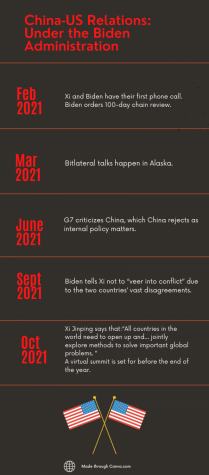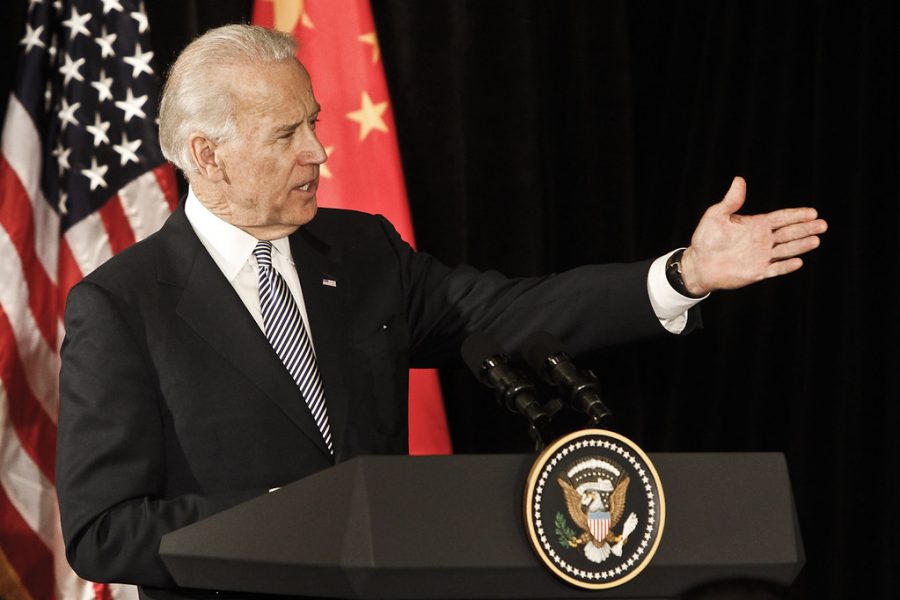The United States and China have been trying to create a better economic relationship so that they are equal on the level of tariffs and importation. Headed by President Joe Biden and President Xi Jinping, the two leaders and their countries have been off to a rough start since the beginning of Biden’s administration.
The main conflicts between the two countries are the U.S. wanting China to have fairer economic policies and lift tariffs from foreign imports. The U.S. also has some moral and ethical differences from China that come into play, including how America disagrees with how the Chinese Communist Government has been managing Taiwan, the Uyghur Genocide, and Hong Kong.
American imports rely on about $360 billion of Chinese products, and many export controls and bans in China prevent Google and other technology companies from entering the Chinese market.
The Biden administration has also started using some of former President Donald Trump’s actions. In June, more Chinese companies were put on prohibition in the United States. In July, they expanded the list of sanctioned Chinese officials for actions in Hong Kong.
In regards to China-U.S. relations since Trump, Carlmont students have many thoughts.
“I think Trump did a great job with China relations. He managed to … pull out of a lot of Pacific state defense agreements, leaving China open to take the leadership position in those agreements. So China’s getting more power,” said junior Tyler Peng. “I’m really happy with the U.S. government right now.”
This month, Xi and Biden have had their first virtual summit. While American businesses say they are getting frustrated with Biden’s ambiguity regarding the U.S. and China’s economic interactions and plans, some Carlmont students are unbothered.

“At the moment, there’s nothing that I’ve seen that is outrageously bad or good,” said junior Austin Wu.
Biden and Xi’s interactions started seriously in February when they had their first phone call. However, other China-U.S. negotiations are done by Jake Sullivan, the U.S. national security adviser, and Yang Jiechi, China’s Director of the Office of the Foreign Affairs Commissions. After the phone call, the White House released a readout of their interaction.
“President Biden committed to pursuing practical, results-oriented engagements when it advances the interests of the American people and those of our allies,” the readout said.
In February 2021, Biden ordered a 100-day chain review.
“We shouldn’t have to rely on a foreign country — especially one that doesn’t share our interests or our values — in order to protect and provide our people during a national emergency,” Biden said.
Then, on March 18 and 19, bilateral talks between the two countries happened in Alaska.
On June 13, 2021, Canada, France, Germany, Italy, Japan, the UK, and the U.S., otherwise known as the G7, criticized China after being prompted by Biden.
Both of the meetings in March and June involved discussing China’s human rights policies in Hong Kong, Taiwan, the Uyghur minority treatment in Xinjiang, and the lack of transparency on the origins of COVID-19.
In September 2021, Biden told Xi not to “veer into conflict” due to the two countries’ vast disagreements.
“All countries in the world need to open up and … jointly explore methods to solve important global problems,” said Xi on October 15, 2021, at the Zhongguan Cun Conference.
Biden and Xi’s relationship has spurred conversation within Carlmont as the student body attempts to navigate their recent actions.
“Xi is being evasive around lifting tariffs and about Taiwan, and so far, Biden’s negotiating isn’t really helping them fix any issues or improve the Sino-US relations,” said Derek Zhang, a sophomore.
Biden and Xi have since continued on this trajectory. When asked about his goals during his first formal news conference as president, Biden made a broad statement regarding China-U.S. relations.
“China has an overall goal … to become the leading country in the world,” President Joe Biden said on March 25, 2021. “That’s not going to happen on my watch because the United States is going to continue to grow.”












